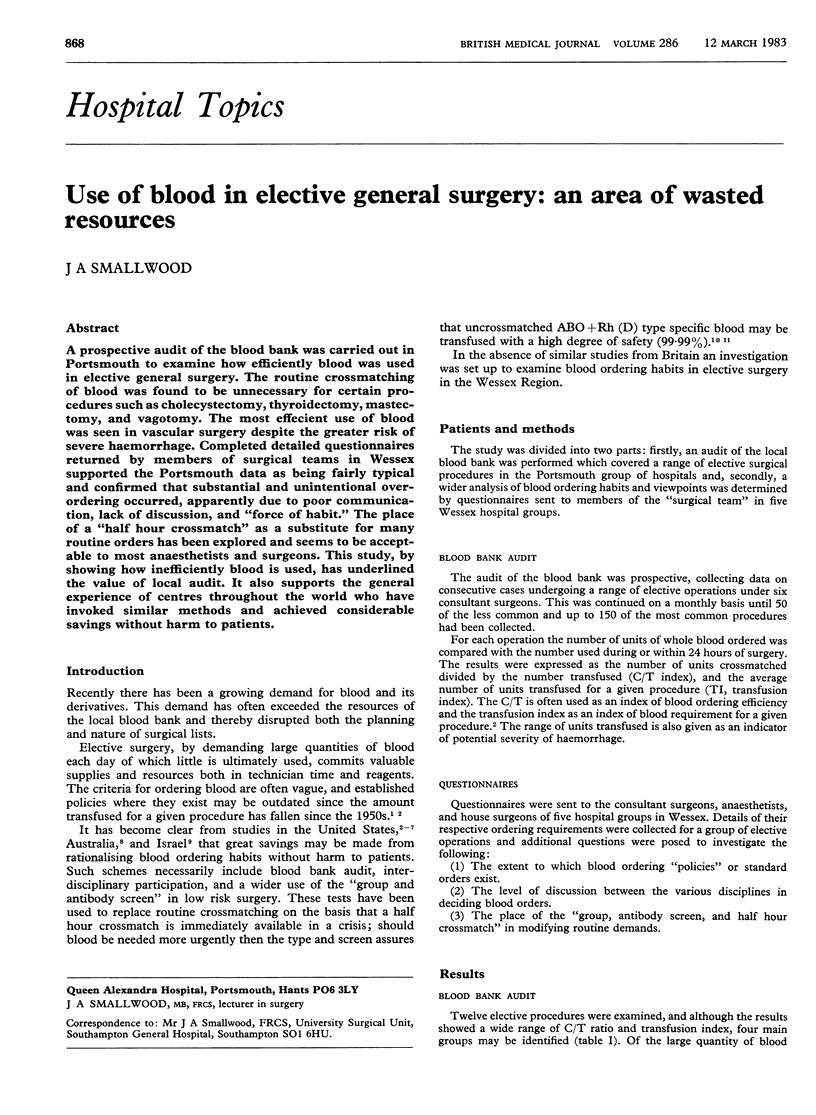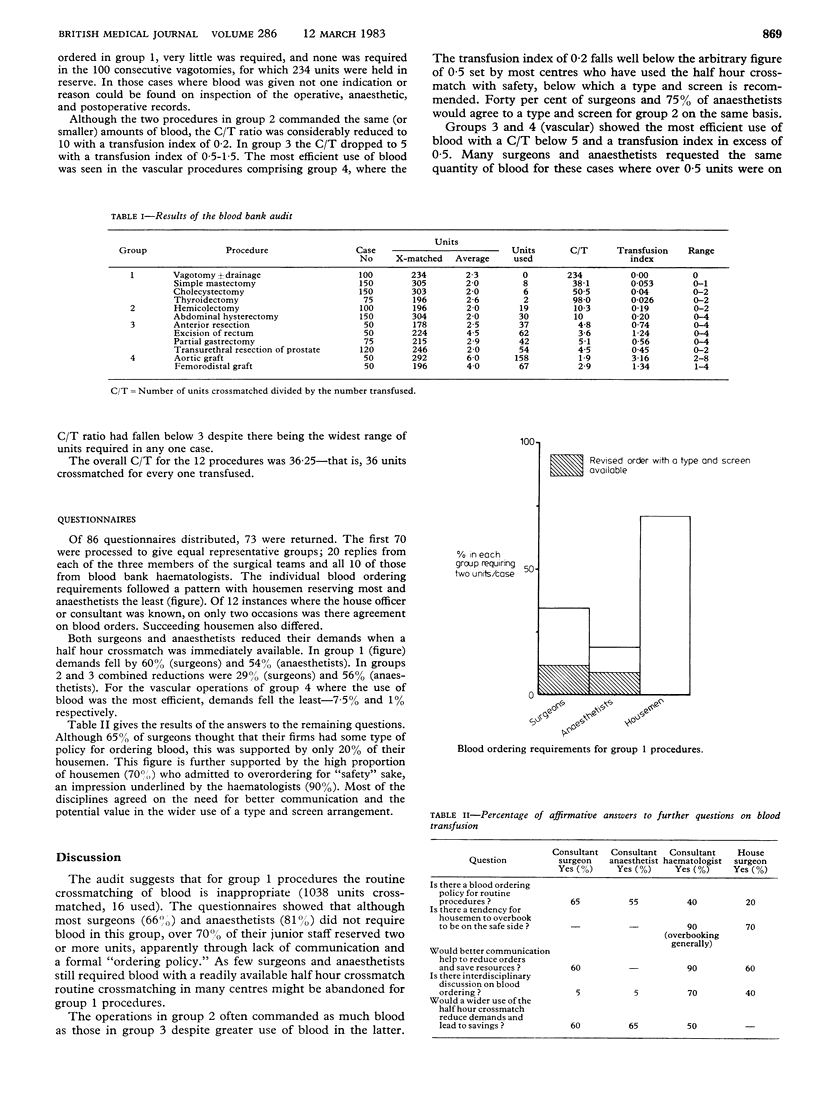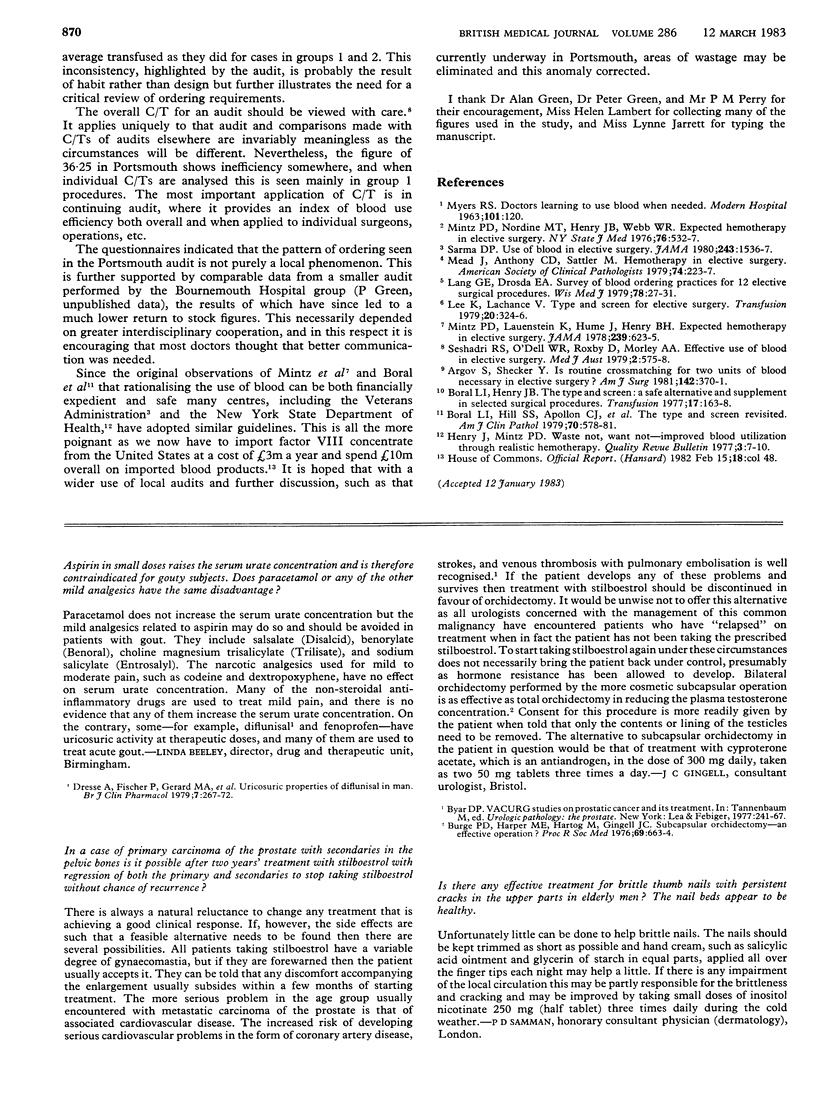Abstract
A prospective audit of the blood bank was carried out in Portsmouth to examine how efficiently blood was used in elective general surgery. The routine crossmatching of blood was found to be unnecessary for certain procedures such as cholecystectomy, thyroidectomy, mastectomy, and vagotomy. The most efficient use of blood was seen in vascular surgery despite the greater risk of severe haemorrhage. Completed detailed questionnaires returned by members of surgical teams in Wessex supported the Portsmouth data as being fairly typical and confirmed that substantial and unintentional overordering occurred, apparently due to poor communication, lack of discussion, and "force of habit." The place of a "half hour crossmatch" as a substitute for many routine orders has been explored and seems to be acceptable to most anaesthetists and surgeons. This study, by showing how inefficiently blood is used, has underlined the value of local audit. It also supports the general experience of centres throughout the world who have invoked similar methods and achieved considerable savings without harm to patients.
Full text
PDF


Selected References
These references are in PubMed. This may not be the complete list of references from this article.
- Argov S., Shechter Y. Is routine crossmatching for two units of blood necessary in elective surgery? Am J Surg. 1981 Sep;142(3):370–371. doi: 10.1016/0002-9610(81)90351-2. [DOI] [PubMed] [Google Scholar]
- Boral L. I., Henry J. B. The type and screen: a safe alternative and supplement in selected surgical procedures. Transfusion. 1977 Mar-Apr;17(2):163–168. doi: 10.1046/j.1537-2995.1977.17277151923.x. [DOI] [PubMed] [Google Scholar]
- Boral L. I., Hill S. S., Apollon C. J., Folland A. The type and antibody screen, revisited. Am J Clin Pathol. 1979 May;71(5):578–581. doi: 10.1093/ajcp/71.5.578. [DOI] [PubMed] [Google Scholar]
- Burge P. D. Subcapsular orchidectomy--an effective operation? Proc R Soc Med. 1976 Sep;69(9):663–664. [PMC free article] [PubMed] [Google Scholar]
- Dresse A., Fischer P., Gerard M. A., Tempero K. F., Meisinger M. A., Bolognese J. A., Verhaest L. Uricosuric properties of diflunisal in man. Br J Clin Pharmacol. 1979 Mar;7(3):267–272. doi: 10.1111/j.1365-2125.1979.tb00931.x. [DOI] [PMC free article] [PubMed] [Google Scholar]
- Henry J. B., Mintz P. D. Waste not, want not: improved blood utilization through realistic hemotherapy guidelines. QRB Qual Rev Bull. 1977 Dec;3(12):7-8, 10. [PubMed] [Google Scholar]
- Lang G. E., Drozda E. A., Jr Survey of blood ordering practices for 12 elective surgical procedures. Wis Med J. 1979 Jan;78(1):27–31. [PubMed] [Google Scholar]
- Lee K., Lachance V. Type and screen for elective surgery. Results of one year's experience in a small community hospital. Transfusion. 1980 May-Jun;20(3):324–326. doi: 10.1046/j.1537-2995.1980.20380214900.x. [DOI] [PubMed] [Google Scholar]
- Mead J. H., Anthony C. D., Sattler M. Hemotherapy in elective surgery: an incidence report, review of the literature, and alternatives for guideline appraisal. Am J Clin Pathol. 1980 Aug;74(2):223–227. doi: 10.1093/ajcp/74.2.223. [DOI] [PubMed] [Google Scholar]
- Mintz P. D., Lauenstein K., Hume J., Henry J. B. Expected hemotherapy in elective surgery. A follow-up. JAMA. 1978 Feb 13;239(7):623–625. [PubMed] [Google Scholar]
- Mintz P. D., Nordine R. B., Henry J. B., Webb W. R. Expected hemotherapy in elective surgery. N Y State J Med. 1976 Apr;76(4):532–537. [PubMed] [Google Scholar]
- Sarma D. P. Use of blood in elective surgery. JAMA. 1980 Apr 18;243(15):1536–1538. [PubMed] [Google Scholar]
- Seshadri R. S., Odell W. R., Roxby D., Morley A. A. Effective use of blood in elective surgical procedures. Med J Aust. 1979 Dec 1;2(11):575–578. doi: 10.5694/j.1326-5377.1979.tb127191.x. [DOI] [PubMed] [Google Scholar]


